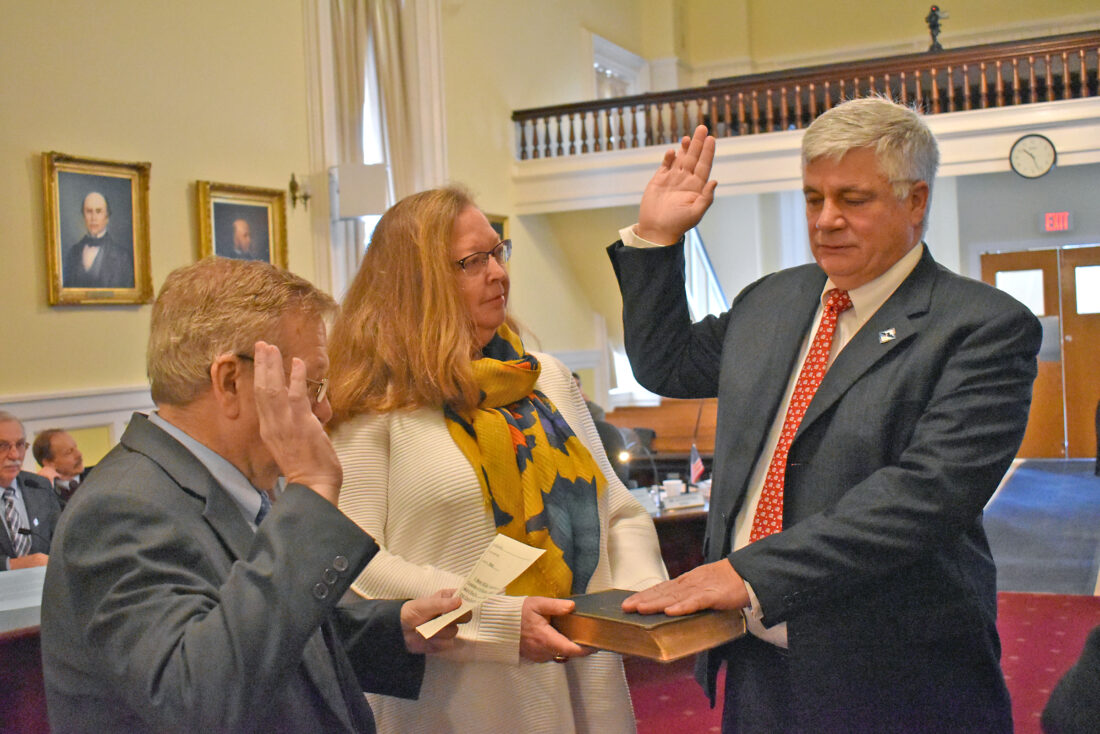Shaun Gillilland to retire
Though his name will be on ballot, he plans to step away

Willsboro town Supervisor Shaun Gillilland, right, is sworn in as chairman of the Essex County Board of Supervisors in January 2020 by Essex County Clerk Joseph Provoncha, left, at the board’s organizational meeting. Gillilland’s wife Linda looks on. (Enterprise photo — Elizabeth Izzo)
WILLSBORO — Willsboro town supervisor and Essex County board Chair Shaun Gillilland is retiring at the end of his term, capping off a long career as a leader in local politics.
Though his name will still appear on the independent “Willsboro-Reber Party” line on the Nov. 4 ballot, Gillilland said he won’t accept another term.
Last month, Darren Dickerson earned the Republican Party primary nomination over Gillilland 62-47. Gillilland said he would decline if he won the election on the independent line.
He had planned to retire earlier this year, but then several people came to him and asked him to run again. Still, he said at 67, he plans to truly step away. It is a difficult decision to make, he said. Dedication to public service is important to him. He’s built a lot of relationships in government and said there’s numerous long-standing town and county issues he is working on to this day.
Gillilland feels he’s leaving the town and county better than he found them.
He underwent an intense operation in November and is doing well physically, but is looking to reduce the stress in his life. The state of national politics is “fairly caustic,” and he said it doesn’t agree with his particular moderate form of Republicanism.
The job of leading the town and county is stressful, but he also finds it “extraordinarily rewarding.”
Gillilland moved to the area in 2005 after retiring from a 25-year career in the Navy. He comes from a long line of people involved in politics. He has ancestors who attended the first Republican National Convention; his great-grandfather was in the Iowa state Senate; his grandfather was a judge, chair of the Iowa Republican party and a campaign manager for Dwight D. “Ike” Eisenhower and his father was heavily involved in politics.
Upon moving here, Gillilland said the community was so helpful and welcoming to him as he started a farm with his family, he wanted to give back. So he dipped his toe in the “family business.”
He started on the town planning board, became a fire commissioner in 2009, was elected as a Willsboro town board member and soon after became the supervisor. This is his 12th year as supervisor and his sixth as county board chair.
While he has been able to change a lot through his work, it has also changed him. Gillilland said the job encourages growth. The first thing he had to learn was how to lead in politics. That took a bit of unlearning his military background.
“Leadership in the military is quite a bit different than leadership in local government,” Gillilland said. “Things don’t just happen because you bark it.”
Local government is about collaborating, building consensus, articulating a vision and getting people to believe in that vision.
He’s proud of some of the advancements he’s been able to be a part of in Willsboro, which has a population of 1,900 — the removal of a dam on the Bouquet River in 2015, which was a barrier to salmon; improving the parks; hiring “high-performing staff;” replacing the wastewater treatment plant and winning many grants.
There have been rough spots, and there are still many long-standing issues he wants to see resolved — the removal of the old jail, issues at the fish hatchery, a fight with the state over solid waste. These haven’t been put to bed yet, but he feels they’ve made progress.
This summer, ground was broken on a new $4 million youth agriculture building and home for Cornell Cooperative Extension Service and the office of Soil and Water Conservation at the Essex County Fair Grounds. Gillilland said he’s been working to get a new building for these groups since he started 12 years ago.
“Government works at the speed of geologic time sometimes,” he said.
One of the most pressing ongoing issues he sees is maintaining an emergency medical services system that guarantees prompt access to everyone. This is an issue nationwide as volunteers are fading away, but it is particularly strong in rural areas, which can’t afford to pay for a full-time professional system and have volunteer systems in danger of collapsing, he said.
The dual position of town supervisor and county board member is challenging, he said. It requires balancing the needs of both as equal top priorities. But he thinks having a board of supervisors — where town supervisors are also the county representatives, as opposed to a board of legislators — is a “perfect match” for a large, rural county like Essex County. Gillilland said it shortens the distance between him as a county representative and the public, and the distance between him as a town representative and the state.
Helping guide the county through the coronavirus pandemic was a challenging point in his career. There was “no script” for how things should be done. But he feels they did a good job. The county never had to lay anyone off and did not go into debt as others did.
Gillilland said he feels the county’s relationship with the state is better than when he started and he’s proud of the board he works with. They are professional, with no partisan acrimony, he said. They disagree often, but work it out cordially.
He praised both the town and county staff he works with, too.
In his second retirement, Gillilland said he plans to spend more time on the farm, his “happy place.” He’s a believer in regenerative agriculture and soil conservation and plans to work in these fields as he steps out of the political field.



